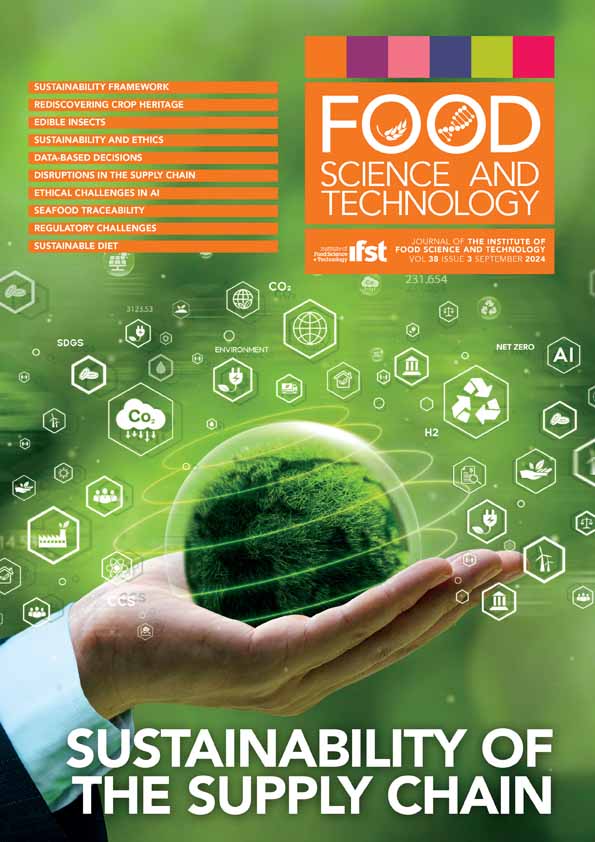The role of camel milk as a protective factor on rats infected with indomethacin-induced gastric ulcer
Q2 Agricultural and Biological Sciences
引用次数: 0
Abstract
This research was conducted to evaluate the nutritional content of camel milk and the difficulties that accompany them when taken with indomethacin. The results observed that camel milk is a rich source of nutritional values and antioxidants. The biological experimental was divided into six groups. The first group was control negative, and the groups G2, G3, G4, and G5 had orally one dose of indomethacin (30 mg/kg body weight) to induce ulcers. The G2 was considerably a positive control, and the groups G3, G4, and G5 had orally 5, 10, and 15 mL/kg body weight daily camel milk. The results observed that camel milk markedly raised concentrations of enzymatic antioxidants while concurrently lowering malondialdehyde levels in comparison to the positive group. However, rats taken orally 15 mL/kg camel milk showed significantly lower serum IL-6 and tumor necrosis factor-α concentration compared to 5 and 10 mL/kg camel milk. Rats given indomethacin showed a significant decrease in cyclooxygenase (COX-2) and prostaglandin E2 (PGE2) levels and also a significant increase in cytochrome P450 reductase activity. These results were based on the measurements of cyclooxygenase activity, PGE2 concentration, and cytochrome P450 reductase activity in the gastric tissues. The results from macroscopic examination and histopathological examination of gastric ulcers in normal and treated rats groups with camel milk confirmed the above results by serum and gastric tissue. Therefore, camel milk has a potent ulcer-healing impact on gastrointestinal injury caused by indomethacin. The potential cytoprotective mechanism and antioxidant characteristics of camel milk may be responsible for its antiulcer efficacy.骆驼奶对吲哚美辛诱发胃溃疡大鼠的保护作用
这项研究旨在评估骆驼奶的营养成分以及与吲哚美辛一起服用时的困难。结果表明,骆驼奶含有丰富的营养价值和抗氧化剂。生物实验分为六组。第一组为阴性对照组,G2、G3、G4 和 G5 组口服一剂吲哚美辛(30 毫克/千克体重)诱发溃疡。G2 组为阳性对照,G3、G4 和 G5 组每天分别口服 5、10 和 15 毫升/千克体重的骆驼奶。结果发现,与阳性对照组相比,骆驼奶明显提高了酶抗氧化剂的浓度,同时降低了丙二醛的水平。然而,与每公斤 5 毫升和 10 毫升驼奶相比,口服 15 毫升/公斤驼奶的大鼠血清 IL-6 和肿瘤坏死因子-α 的浓度明显较低。大鼠服用吲哚美辛后,环氧化酶(COX-2)和前列腺素 E2(PGE2)水平明显下降,细胞色素 P450 还原酶活性也明显增加。这些结果基于对胃组织中环氧化酶活性、PGE2 浓度和细胞色素 P450 还原酶活性的测量。正常大鼠组和用骆驼奶治疗的大鼠组的胃溃疡宏观检查和组织病理学检查结果证实了血清和胃组织的上述结果。因此,骆驼奶对吲哚美辛引起的胃肠道损伤有较强的溃疡愈合作用。骆驼奶潜在的细胞保护机制和抗氧化特性可能是其抗溃疡功效的原因。
本文章由计算机程序翻译,如有差异,请以英文原文为准。
求助全文
约1分钟内获得全文
求助全文
来源期刊

Food Science and Technology
农林科学-食品科技
自引率
0.00%
发文量
0
审稿时长
12 weeks
期刊介绍:
Information not localized
 求助内容:
求助内容: 应助结果提醒方式:
应助结果提醒方式:


